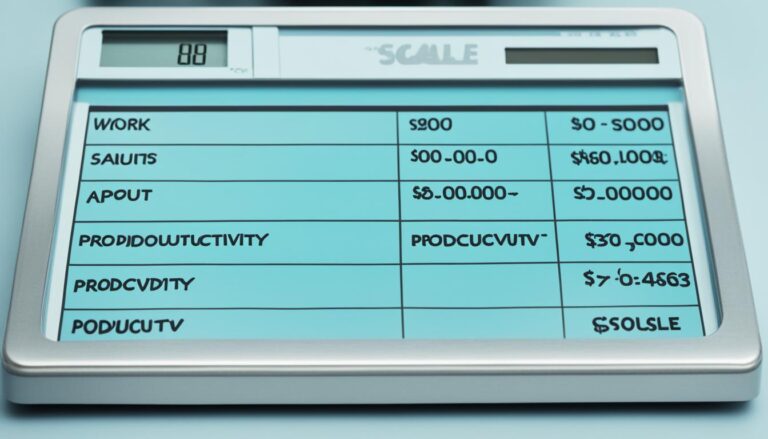Unlock Your Potential: How to Be More Productive

Are you tired of feeling overwhelmed and unproductive? Do you constantly find yourself struggling to meet deadlines and accomplish your goals? It’s time to break free from the shackles of inefficiency and unlock your true potential.
In this article, we will guide you through a journey of self-discovery and provide you with invaluable strategies and techniques to enhance your productivity, improve efficiency, and boost your work performance. Say goodbye to procrastination and hello to a more productive and fulfilling life.
But here’s the burning question: Are you ready to take the first step towards becoming a productivity powerhouse? Are you ready to transform your approach to time management and unlock your true potential?
Key Takeaways:
- Create clear and achievable goals using the SMART framework
- Master effective time management techniques such as prioritization and time-blocking
- Achieve a healthy work-life balance to recharge and rejuvenate
- Manage stress effectively to prevent burnout and improve productivity
- Optimize your daily routine for maximum efficiency
Setting Clear Goals for Productivity Success
Setting clear goals is crucial for unlocking your productivity potential. When you have a clear vision and purpose, you can set yourself up for success by breaking it down into smaller, manageable goals.
To ensure your goals are effective, it’s essential to make them specific, measurable, attainable, relevant, and time-bound (SMART). This framework helps you create goals that are well-defined and realistic.
Here’s a breakdown of each SMART goal component:
- Specific: Clearly define what you want to achieve. The more specific, the better.
- Measurable: Set quantifiable criteria to evaluate your progress and success.
- Attainable: Make sure your goals are within reach and realistic to avoid frustration.
- Relevant: Ensure your goals align with your overall vision and contribute to your long-term objectives.
- Time-bound: Set deadlines or timeframes to create a sense of urgency and keep yourself accountable.
Once you’ve set your SMART goals, it’s crucial to write them down. Jotting them on paper or using a digital tool helps solidify your commitment and serves as a constant reminder of what you’re working towards.
Regularly review and adjust your goals as needed. As you progress and gain new insights, you may need to refine your goals or make course corrections. This ongoing evaluation ensures that your goals stay relevant and aligned with your evolving vision.
Remember, goal setting is not a one-time activity but a continuous process. By setting clear, SMART goals, and regularly reviewing and adjusting them, you’ll be well on your way to achieving productivity success!

| Benefits of Setting Clear Goals | |
|---|---|
| Increased focus | Improved productivity |
| When you have clear goals, you know exactly what to prioritize and where to allocate your time and energy. | Setting goals helps you stay on track, avoids distractions, and encourages efficient use of your resources. |
| Enhanced motivation | Heightened sense of accomplishment |
| Having well-defined goals provides a sense of purpose and ignites your inner motivation to take action. | When you achieve your goals, big or small, it boosts your confidence and drives you to accomplish even more. |
Effective Time Management Strategies
Time management is a crucial skill to master if you want to maximize your productivity. With the right strategies, you can make the most of your time and accomplish your goals efficiently. Here are some effective time management techniques to help you stay focused and organized:
Prioritize Tasks
One of the key aspects of effective time management is prioritizing tasks. Start by identifying the urgency and importance of each task on your to-do list. Focus on completing high-priority tasks first, ensuring that you allocate your time and energy to the most important activities.
Time-Blocking
Time-blocking is a powerful technique that involves allocating specific time blocks for different tasks or activities. By scheduling dedicated time slots for specific tasks, you can enhance focus and minimize distractions. This allows you to work efficiently and make progress on your goals.
Here’s an example of how you can utilize time-blocking:
| Time Block | Task/Activity |
|---|---|
| 9:00 AM – 10:00 AM | Respond to emails |
| 10:00 AM – 11:30 AM | Work on project A |
| 11:30 AM – 12:00 PM | Take a break |
| 12:00 PM – 1:00 PM | Attend team meeting |
By structuring your day in this way, you ensure that you allocate dedicated time for each task, increasing productivity and reducing the likelihood of procrastination.
Pomodoro Technique
The Pomodoro Technique is a time management method that involves breaking your work into focused, uninterrupted intervals, usually 25 minutes each, known as “Pomodoros.” After each Pomodoro, take a short break of around 5 minutes. After completing four Pomodoros, take a longer break of 15-30 minutes.
This technique helps you maintain high levels of concentration and productivity while also preventing burnout. By working in short bursts and taking regular breaks, you can stay refreshed and motivated throughout the day.
Minimize Distractions
To effectively manage your time, it’s essential to minimize distractions. Turn off notifications on your phone and computer, close unnecessary tabs or apps, and create a dedicated workspace that is free from interruptions. By eliminating distractions, you can maintain focus and complete tasks more efficiently.
Learn to Say No
Learning to say no is a valuable skill in time management. It’s important to recognize your limitations and prioritize your commitments. If a task or request does not align with your goals or values, don’t be afraid to decline politely. By saying no to unnecessary commitments, you can free up valuable time and energy for activities that truly matter to you.
By implementing these time management strategies, you can enhance your productivity and make the most of your time. Remember, effective time management is not about doing more, but rather about optimizing your tasks, focus, and energy.

Achieving a Healthy Work-Life Balance
Achieving a healthy work-life balance is crucial for your overall well-being and productivity. In today’s fast-paced world, it’s easy to get caught up in work and neglect other important aspects of your life. However, by prioritizing work-life balance, you can experience greater satisfaction in both your personal and professional life.
To achieve a healthy work-life balance, it’s important to set clear boundaries between work and personal life. This means establishing designated work hours and ensuring that you have time for yourself, your family, and your hobbies. By setting boundaries, you can prevent work from encroaching on your personal time and create space for relaxation and rejuvenation.
Self-care should also be a priority when it comes to work-life balance. Take the time to prioritize activities that nourish your mind, body, and soul. Whether it’s practicing meditation, exercising, or engaging in creative pursuits, make sure to dedicate time for self-care every day. Remember, taking care of yourself enables you to show up as your best self in all areas of your life.
Another important aspect of achieving work-life balance is taking time off. Use your vacation days and breaks to disconnect from work and recharge. Taking breaks from work allows you to rest and rejuvenate, which in turn enhances your productivity and creativity when you return. Don’t underestimate the power of a well-deserved break.
Learning to say no is another crucial skill for maintaining work-life balance. It’s important to recognize your limits and not overcommit yourself. By saying no to non-priority tasks or activities that don’t align with your goals, you can create space for the things that truly matter to you.
Lastly, being present in the moment is key to achieving work-life balance. When you’re spending time with loved ones or engaging in activities outside of work, be fully present and mindful. This allows you to fully enjoy and appreciate the moments that matter most to you.
By prioritizing work-life balance, setting boundaries, prioritizing self-care activities, taking time off, learning to say no, and being present, you can achieve a healthy work-life balance that enhances your overall well-being and productivity.

Tips for Achieving a Healthy Work-Life Balance
- Set clear boundaries between work and personal life.
- Make self-care a priority.
- Take advantage of your vacation days and breaks to recharge.
- Learn to say no to non-priority tasks.
- Be present in the moment and fully engage with your loved ones and activities outside of work.
Managing Stress for Increased Productivity
Stress can hinder your productivity, leaving you overwhelmed and unable to perform at your best. However, there are effective strategies you can implement to manage stress and unlock your productivity potential.
Mindfulness: A Key to Reducing Stress and Improving Focus
One powerful technique for managing stress is practicing mindfulness. By cultivating present moment awareness and focusing on the task at hand, you can reduce anxiety and improve your ability to concentrate. Take a few minutes each day to practice deep breathing, observe your thoughts without judgment, and bring your attention back to the present. Incorporating mindfulness into your daily routine can help you stay calm and centered amidst the stresses of work.
Recharge with Regular Breaks
When you’re feeling stressed and overwhelmed, taking regular breaks is crucial. Allow yourself short breaks throughout the day to recharge and rejuvenate. Step away from your workspace, engage in physical activity, or indulge in activities that bring you joy. These breaks will not only alleviate stress but also increase your energy levels and enhance your ability to concentrate when you return to work.
Make Self-Care a Priority
In the hustle and bustle of work life, it’s easy to neglect self-care. However, prioritizing self-care activities is essential for managing stress and maintaining your well-being. Take time each day to engage in activities that promote relaxation and nourishment, such as exercise, meditation, or engaging in hobbies. By nurturing yourself, you can better manage stress and improve your overall productivity.
Set Realistic Expectations
Setting unrealistic expectations for yourself can lead to increased stress and decreased productivity. It’s important to set realistic goals and tasks that align with your capabilities. Break down larger projects into smaller, more manageable tasks and set achievable deadlines. By setting realistic expectations, you can reduce self-imposed pressure and enhance your productivity.
Utilize Time Management Techniques
Effective time management is key to reducing stress and maximizing productivity. Explore time management strategies like the Pomodoro Technique, where you work in focused intervals followed by short breaks. Prioritize tasks based on urgency and importance, and use tools like to-do lists and calendars to keep track of deadlines and commitments. By managing your time effectively, you can reduce stress and accomplish more in a structured and organized manner.

Embracing an Optimized Routine for Productivity
An optimized routine can have a significant impact on your productivity. By incorporating specific habits and practices into your daily life, you can supercharge your ability to achieve your goals and stay focused. Let’s explore some key elements of an optimized routine:
1. Morning Ritual: Setting the Tone for Success
A purposeful morning ritual can set a positive tone for the rest of your day. Consider incorporating activities such as meditation, journaling, or setting intentions to start your day with clarity and focus. By taking the time to connect with yourself and align your thoughts, you’ll be better equipped to tackle your tasks with purpose and enthusiasm.
2. Meal Planning: Fueling Your Productivity
Proper nutrition is vital for sustained energy and mental clarity. Take the time to plan your meals and snacks in advance, ensuring you have nourishing options readily available. By fueling your body with nutrient-dense foods, you’ll optimize your cognitive function and enhance your productivity throughout the day.
3. Daily Movement: Energize Your Body and Mind
Physical exercise is not only beneficial for your physical health but also for your mental well-being. Incorporate daily movement into your routine, whether it’s a gym session, a brisk walk, or a yoga practice. Engaging in regular physical activity boosts your energy levels, reduces stress, and promotes mental clarity, all of which contribute to increased productivity.
4. Prioritize Tasks: Focus on What Matters Most
Effective productivity relies on your ability to prioritize tasks. Take the time to evaluate your to-do list and identify the most essential and impactful tasks. By focusing on what matters most, you’ll allocate your time and energy efficiently, ensuring that you achieve meaningful progress towards your goals.
5. Harness the Power of Breath: Cultivate Focus and Calmness
The breath is a powerful tool for cultivating focus and calmness in your daily life. Incorporate intentional breathing exercises or mindfulness practices into your routine. By harnessing the power of breath, you can reduce stress, increase mental clarity, and enhance your ability to concentrate on your tasks.
| Optimized Routine Benefits | Actions to take |
|---|---|
| Increased focus and productivity | Embrace a purposeful morning ritual |
| Sustained energy levels | Practice meal planning for proper nutrition |
| Improved physical and mental well-being | Engage in daily movement |
| Efficient time and task management | Prioritize tasks based on importance |
| Enhanced focus and calmness | Harness the power of breath |
Incorporating an optimized routine into your daily life can transform your productivity levels. By embracing a purposeful morning ritual, practicing meal planning, engaging in daily movement, prioritizing tasks, and harnessing the power of breath, you’ll unlock your true potential. Take the first step today and create a routine that propels you towards your goals.
Unconventional Strategies to Stay Motivated
Staying motivated is crucial for long-term productivity success. To maintain your focus and drive, try incorporating these unconventional strategies into your routine:
Prioritize and Focus:
Identify your most important tasks and prioritize them accordingly. By focusing on what truly matters, you can avoid getting overwhelmed by less significant obligations.
Celebrate Small Wins:
Recognize and celebrate your achievements, no matter how small they may seem. By acknowledging your progress, you reinforce positive behaviors and boost your motivation to continue striving for success.
Eliminate Distractions:
Create an environment conducive to concentration by eliminating distractions. Turn off notifications, close unnecessary tabs, and find a quiet space to work. Distraction-free work sessions can significantly enhance your productivity.
Find Inspiration:
Seek inspiration from various sources, such as books, podcasts, or TED Talks. Engaging with diverse ideas and perspectives can spark creativity and reignite your motivation to tackle challenges.
Take Breaks:
Avoid burnout by taking regular breaks throughout your workday. Use these moments to recharge, relax, and rejuvenate. Stepping away from your tasks temporarily can actually enhance your overall productivity.
Practice Self-Care:
Make self-care a priority in your daily routine. Engage in activities that nourish your mind, body, and soul, such as exercise, meditation, journaling, or spending time in nature. Taking care of yourself allows you to show up as your best self in all areas of life.
Stay Organized:
Maintain an organized workspace and schedule to minimize distractions and maximize efficiency. Keep track of your tasks and deadlines using digital tools or a physical planner. An organized environment promotes clarity and helps you stay on top of your responsibilities.
Find an Accountability Partner:
Team up with a trusted colleague, friend, or mentor who can help you stay accountable to your goals. Share your progress, challenges, and milestones with them, and celebrate each other’s achievements. Having an accountability partner provides support, encouragement, and motivation along your productivity journey.
Unconventional Strategies Comparison
| Strategy | Benefits |
|---|---|
| Prioritize and Focus | Enhanced productivity and goal achievement. |
| Celebrate Small Wins | Increased motivation and reinforcement of positive behavior. |
| Eliminate Distractions | Improved concentration and reduced interruptions. |
| Find Inspiration | Reignited creativity and fresh perspectives. |
| Take Breaks | Prevention of burnout and heightened productivity. |
| Practice Self-Care | Enhanced overall well-being and work-life balance. |
| Stay Organized | Efficient task management and reduced stress. |
| Find an Accountability Partner | Mutual support, encouragement, and goal accountability. |
Conclusion
Unlocking your productivity potential is within reach. By implementing effective goal setting techniques, mastering time management strategies, achieving a healthy work-life balance, managing stress, optimizing your routine, and staying motivated, you can increase your productivity and reach your goals.
Start by setting clear, specific goals using the SMART framework. Break them down into manageable tasks and regularly review and adjust them as needed. Prioritize your time and use techniques like time-blocking and the Pomodoro technique to increase focus and minimize distractions.
Remember to prioritize self-care and make time for activities that recharge and rejuvenate you. Set boundaries between work and personal life, take breaks, and practice mindfulness to manage stress effectively. Embrace an optimized routine that includes morning rituals, proper nutrition, daily movement, and harnessing the power of breath.
To stay motivated, celebrate your small wins, eliminate distractions, find inspiration in various mediums, and consider partnering with someone for mutual accountability. With these strategies in place, you’ll be well on your way to unlocking your productivity potential and achieving your goals.






